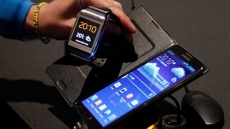Does your child have poor social skills? Limit his or her use of the digital screen.
In the world of smartphones and tablets, social skills among children are on the decline as the kids give less time for face-to-face interaction due to their increased use of digital media, says a study.
American scientists have found that sixth-graders who went five days without a smartphone, television or other digital media did better at reading human emotions than sixth-graders from the same school who spent hours each day with their gadgets.
"Many people are looking at the benefits of digital media in education and not many are looking at the costs," said Patricia Greenfield, a professor of psychology at University of California, Los Angeles (UCLA).
"Losing the ability to understand the emotions of other people is one of the costs. The displacement of in-person social interaction by screen interaction seems to be reducing social skills," Greenfield said.
For the study, psychologists studied two sets of sixth-graders from a school in southern California.
The first set of 51 children lived together for five days at the Pali Institute, a nature and science camp about 110 km from Los Angeles.
At the camp, the students were not allowed to use electronic devices.
The other lot of 54 children stayed in their homes with their gadgets.
The children at the camp improved significantly over the five days in their ability to read facial expressions and other nonverbal cues to emotions, compared with the students who continued to use their media devices.
The findings applied equally to both boys and girls.
"If you are not practicing face-to-face communication, you could be losing important social skills," added lead author Yalda Uhls, a senior researcher with UCLA's Children's Digital Media Center.
"Emoticons are a poor substitute for face-to-face communication. "We are social creatures. We need device-free time," Uhls added.
The research is slated to appear in the journal Computers in Human Behavior.





